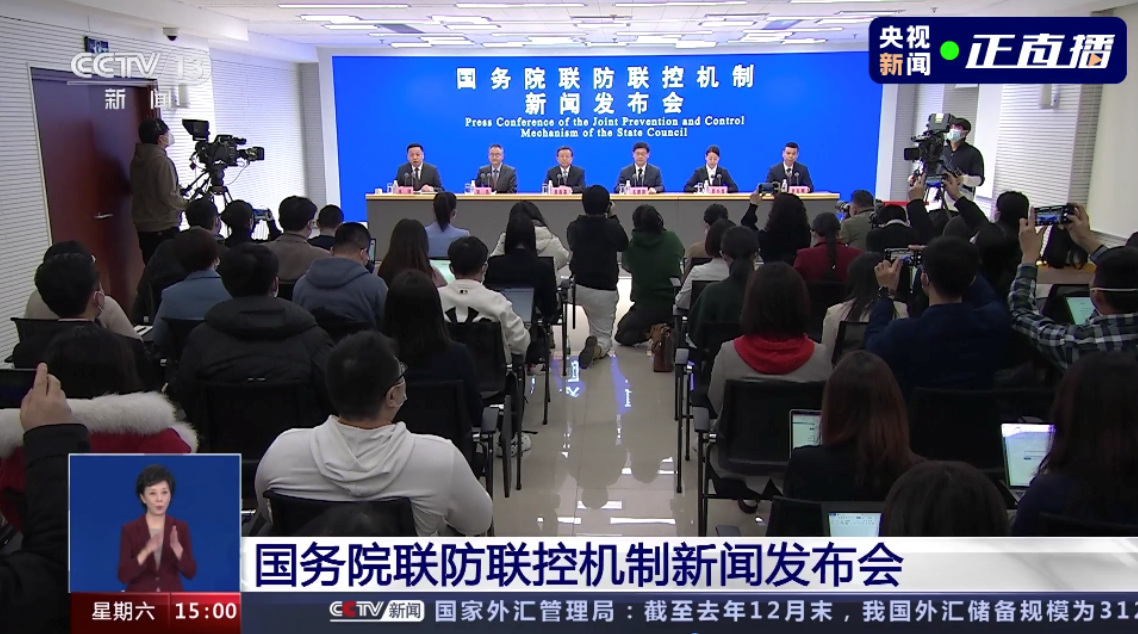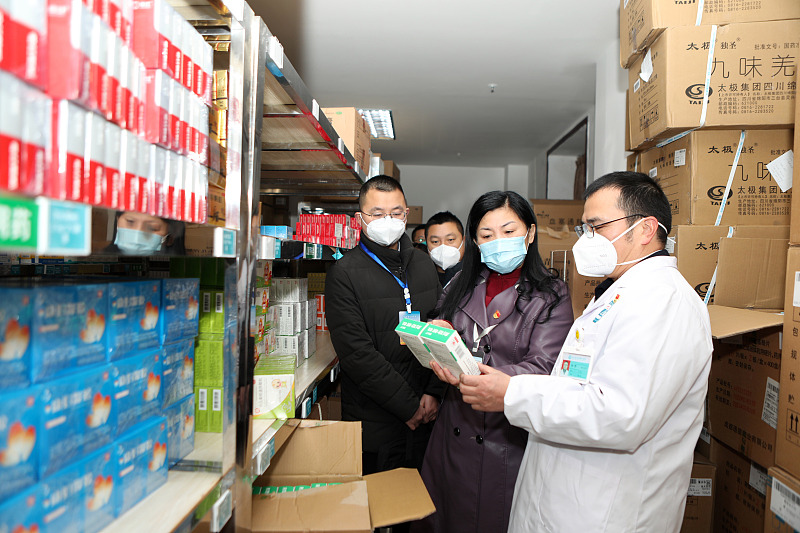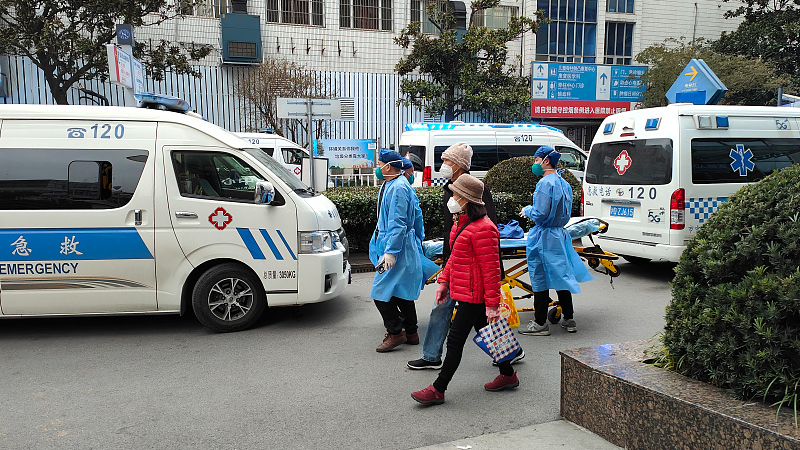As China's Spring Festival is coming soon, many will return to their hometowns for holidays. With the dense flow of travelers and frequent freight logistics activities, it will be a considerable test for the country to cope with a possible mass infection during the holidays. And with an undeveloped healthcare system and weak logistics distribution foundation, China's rural areas will have to suffer during the winter break.
To face up the challenges, the Chinese government is making full preparations for the possible mass infection during the upcoming Spring Festival, including measures to cope with the medical supply shortage, coordinate rural and urban medical resources, and ensure severely infected people get timely treatment.
The Joint Prevention and Control Mechanism of the State Council (JPCMSC) on Saturday afternoon introduced the situation of China's epidemic prevention and control measures in rural areas. Officials from the National Health Commission (NHC) and Ministry of Agriculture and Rural Affairs, experts and grassroots representatives attended the briefing.

The Joint Prevention and Control Mechanism of the State Council introduces the situation of China's epidemic prevention and control measures in rural areas, Beijing, January 7, 2023. /CFP
The Joint Prevention and Control Mechanism of the State Council introduces the situation of China's epidemic prevention and control measures in rural areas, Beijing, January 7, 2023. /CFP
How to ease medicine shortage in rural areas?
Nie Chunlei, director of the Department of Primary Health of the NHC, said that epidemic prevention and control in rural areas has always been vital. The Chinese government has made a lot of arrangements to relieve the shortage of medical supplies.
The JPCMSC has set up a special supporting team and established a daily dispatch system to coordinate the distribution of medicines and other key medical supplies nationwide. Currently, priority is given to rural medical institutions, ensuring they have access to medicinal products, according to Nie.
He added that the NHC has conducted a daily monitoring, reporting and dispatch system for rural health organizations such as township health centers and community clinics. Once shortages of medical supplies, especially medicines, are found, they will take prompt measures to promote local governments to solve the problem.
Nie noted that for some drugs that are in short supply, the relevant departments had formulated various policies to support enterprises to expand production capacity, and the companies are working overtime to produce these medicines. He also encouraged rural areas to make full play of traditional Chinese medicines (TCM) if Western medicines such as febrifuge are not available at the time.
Regarding the logistics problem in rural areas, Nie said local governments should make centralized procurement to avoid one-after-another personal purchases which may cause a shortage of couriers.
"According to our monitoring, the problem of medicine shortage was prominent in the early days, but recently, with the increase of medicine production capacity and the strengthening of the organization of logistics by local governments, we found that the medicine shortage is gradually alleviating," Nie said.

Inspectors check the storage of drugs at the clinic of Handong Village, Zhutuo Town Health Center, Chongqing, January 4, 2023. /CFP
Inspectors check the storage of drugs at the clinic of Handong Village, Zhutuo Town Health Center, Chongqing, January 4, 2023. /CFP
How to ensure timely treatment of severely infected patients in rural areas?
To ensure efficient and orderly operation and treatment of severely infected people in rural areas, especially those with poor transportation, Nie said the State Council has guided local governments to carry out the following work.
First, using all kinds of tools like telephones, WeChat, cloud service, video and door-to-door service to strengthen daily contacts with key personnel and monitor their health so that once they're found in critical conditions, measures can be taken in the early stages.
Timely treatment requires rural medical and health institutions to expand the pre-hospital first-aid force, so the central government guided all township hospitals and community health centers to be equipped with at least one ambulance and to integrate the 120 first-aid system of each county into the national first-aid system so that a unified dispatch of ambulances can be guaranteed. Besides, for areas with difficulties to equip with an ambulance, a voluntary transport vehicle team should be built to ensure people can get a timely transfer.
Secondly, after ensuring the prompt transfer of patients, the mechanism for timely treatment should also be established. The State Council has asked second and third-tier public hospitals to allocate special personnel to take responsibility for the referral from first-tier hospitals, simplify the referral process and optimize the referral channel.
For the elderly with chronic obstructive pulmonary disease, patients with diabetes, cardiovascular diseases and other basic diseases, they should be promptly transferred to a medical institution with the treatment capacity, and if necessary, they can skip second-tier hospitals and be directly transferred to third-tier hospitals
China has a 3-tier hospital system. They are designated as Primary, Secondary or Tertiary hospitals. A primary hospital is typically a township hospital that is tasked with providing preventive care, minimal health care and rehabilitation services. A secondary hospital tends to be affiliated with a medium size city, county or district and is responsible for providing comprehensive health services. A tertiary hospital is a comprehensive, referral, general hospital at the city, provincial or national level, which is responsible for providing specialist health services, performs a bigger role with regard to medical education and scientific research and serves as a medical hub providing care to multiple regions.
Nie emphasized that third-tier hospitals nationwide have been assigned to provide one-to-one guidance to county-level hospitals to strengthen medical treatment work and send medical staff to the grassroots level to guide the referral and medical treatment.

Ambulances are seen in front of the emergency building of a third-tier hospital in Yangpu District, Shanghai, January 5, 2023. /CFP
Ambulances are seen in front of the emergency building of a third-tier hospital in Yangpu District, Shanghai, January 5, 2023. /CFP
The State Council in last month had issued an overall guide for local governments, hospitals and relative departments to cope with the coronavirus as the country will downgrade the management of COVID-19 from Class A to Class B from January 8, which means mass testing and quarantine will be history, but the challenges hospitals and medical workers will have to face are becoming increasingly grave.
In the overall guide, its eighth clause rolled out general principles for the prevention and control measures in China's rural areas, saying local governments should fortify the coordinated medical service system at the county, township and village levels, strengthen the allocation of medical resources and equip key medical supplies such as oxygenators. And it also stressed the importance of urban and rural medical resources coordination, asking local governments to establish a mechanism of matching assistance between primary hospitals and superior hospitals so that smooth referrals can be guaranteed and people with severe diseases can get proper treatment.